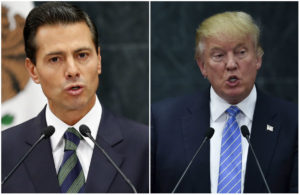
The week Trump stood the constitution on its head
During the electoral campaign, Donald Trump promised to ban Muslims from entering the United States. Last Friday, on Holocaust Remembrance Day—when thoughtful Americans reflect on the shameful role this nation played in that genocide by refusing refuge to countless Jews fleeing the Nazi horror—the president took a giant step toward keeping his promise.
Trump’s executive order, among other things, bans people from seven Muslim countries from entering the United States for the next three months, immediately suspends the refugee program, and closes the door indefinitely to Syrians escaping from one of the bloodiest civil wars of this century.
During World War II this country refused to provide safe-haven to hundreds of thousands of Jews, in effect delivering them to their executioners. Today, the ban on Syrian and other refugees, amid ongoing wanton killing in the Middle East, augurs another preventable tragedy.
This weekend, with a few strokes of a pen, president Donald J. Trump sowed the kind of chaos, fear and anguish across the nation terrorists can only dream of creating. Confusion reigned and protests broke out in airports and communities from New York City to Los Angeles, from Boston to Seattle.

Beyond the public protests, Trump’s action met with immediate rejection and resistance from an unusually broad spectrum of American society. Leading Silicon Valley CEOs from companies like Google, Apple and Facebook criticized the crackdown. The Screen Actors Guild Awards became a forum for condemning the president and his refugee/immigration policy. The mayor of Boston pledged his city would resist, including offering city hall as a refugee haven. Most mayors of sanctuary cities also defied Trump’s threat to cut off all federal funding. Miami-Dade’s mayor predictably broke ranks and caved.
Legal challenges are being mounted, spearheaded by the ACLU. It was clear, in the most concrete way possible, that many Americans backed that organization’s actions. Typically, the ACLU receives about $4 million yearly in online donations. This weekend, online donations skyrocketed to $24 million. Even more remarkable, the Attorneys-General of 16 states joined together in an unprecedented alliance to undertake legal action against elements of the executive order they consider unconstitutional. Congress is preparing to take legislative action to block Trump’s executive orders, and the courts have also put a brake on some of the new policies.
There have been a very few scattered demonstrations in favor of Trump’s latest measures. Most Americans are unhappy or at least uncertain about these actions. One group that must be pleased is ISIS and its extremist counterparts. No sane U.S. strategist would conceive of handing them such a propaganda coup, one that lends some credibility to the Islamic Republic’s principal argument, that the West, led by the United States, is constantly waging a war on Islam itself.

The refugee ban and the indiscriminate exclusion of citizens from seven Muslim-majority countries led the headlines. But Trump did a lot of outrageous things in just his first few days. He directed the start of building of the wall on the Mexican border and continued to claim Mexico would pay for it. This forced Mexican president Enrique Peña Nieto to finally show some cojones, cancel a planned trip to the United States, and tell Trump Mexico wasn’t paying for a wall that amounts to a slap in the face at the country. Peña Nieto’s approval ratings, which had been in the dumps, shot up.
In the context of this whirlwind of obnoxious executive orders, seat-of-the pants implementation, orders announced and quickly rescinded, an unrelated development could have flown under the radar had it not been so brazen and outrageous. Trump struck the first strike against the top echelon of the defense and intelligence establishment and in favor of the extreme right-wing ideologues in his camp when he cancelled the automatic invitation of the Chairman of the Joint Chiefs of Staff and the Director of National Intelligence to attend the “principals” meetings of the National Security Council and extended an invitation to Stephen Bannon, who holds the title of special counsel to the president.
Bannon, best known previously as the head of “Breitbart News,” a right-wing disinformation and propaganda disseminating machine, may be emerging as Trump’s Rasputin, the leader and chief strategist of the darkest of forces within a very dark administration. The Director of National Intelligence and/or the Chairman of the Chiefs of Staff may have been an inconvenient presence when it came to discussing whether the president’s actions against immigration from Muslim countries makes us safer or exposes us to additional risk.
That’s something Bannon knows nothing about and wouldn’t do. But, among other things, he did have the audacity to try to intimidate the New York Times, calling on the paper to “shut up.”
This attempt by a government official, unelected and exempt from Congressional confirmation, strikes against a foundational principle of the nation, freedom of the press, enshrined in the First Amendment to the Constitution. One can’t get more un-American than that.
This country has a long history of right-wing politicians labeling powerless political dissidents “un-American.” In this administration, it is the dissidents that must call out the president himself, his chief propagandist, and other apologists and sycophants as un-American.

